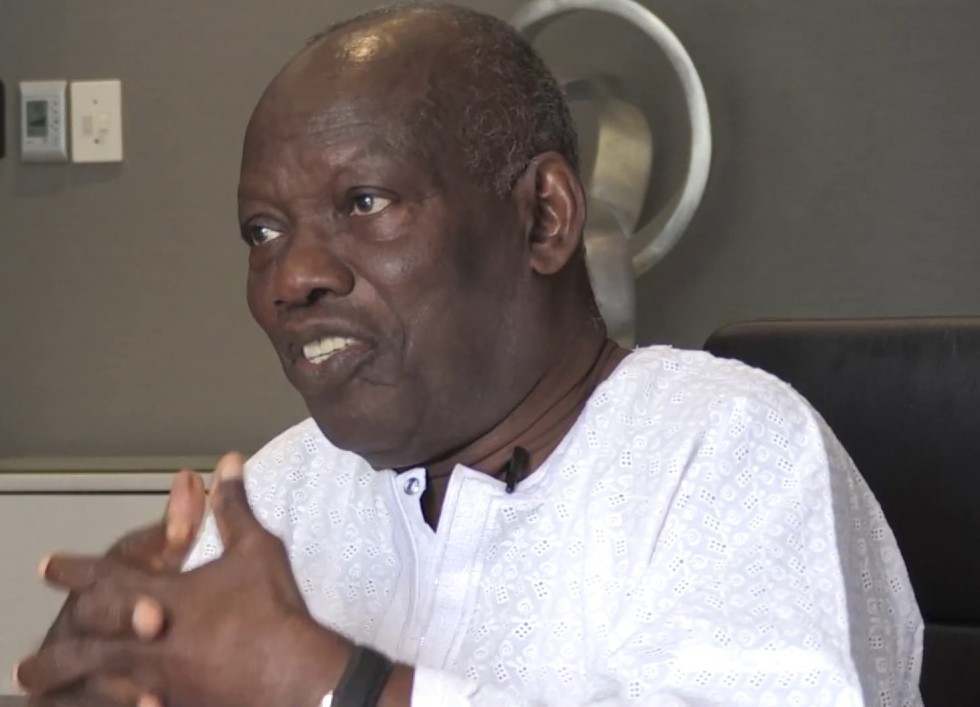It may be a digital world but it is still not possible for everyone to be a witness to the successful coup academia and other managers of meaning in Nigeria have staged in the celebration of one of theirs, actually one of their best: Prof Adele Jinadu at his 79th birthday.

Dr Kole Shettima with another civil society activist from The Electoral Hub
From the pictures available so far and the scene they render imaginable, any observer could ‘see’ Dr. Kole Shettima of MacArthur Foundation ‘aristocratically’ decked for the first time in recent memory. Dignitarianism is not one of his “strengths”, certainly not in the Nigerian sense. No one could equally miss Prof Okello Oculi. Who knows if he won’t be the subject of the next staging?
Prof Okey Ibeanu could be seen sitting on a low setting along with Prof Attahiru Jega and a woman who is most likely to be Prof Antonia Simbine. All three have roots in the Independent National Electoral Commission, (INEC) as ex – National Chairman, (in the case of Jega), an immediate past National Commissioner, (in the case of Ibeanu) and part of the serving intellectual squad, (in the case of Simbine).
When the foregoing is added to the rounded argumentation of the celebrant and the subject matter privileged at the birthday by the incumbent Chairman of the Independent National Electoral Comission, (INEC), it begins to look like a false allegation to hold Prof Jibrin Ibrahim responsible for the selection even though there are still no facts to warrant his discharge and acquittal.

Prof Oculi and another face, (in white) at the occasion
Anyway, Prof Mahmood Yakubu’s interesting Goodwill Message to the colloquium is published below unedited. No mischief intended beyond that it is simply inviting:
I join the friends, well wishers, students, colleagues, and mentees present and those who joined virtually to celebrate a great scholar, Professor Adele Jinadu, who has contributed immensely to democracy and democratic theory in Nigeria and beyond. To refer to Prof Jinadu as a fountain of knowledge, humility and a champion of the improvement of the human condition would certainly not be an under statement. His contributions to knowledge in general and to democracy and elections in particular within Nigeria and in Africa is unparalled. For Jinadu, scholarship is a sustained engagement not just with writing and theorizing about the social world, but also about engaging and connecting with that world. For him, theorizing is a ‘lived’ and ‘living’ experience. It is, in the true sense of the word, praxis, an integral relationship between theory and practice.

Prof Adele Jinadu
Prof Jinadu’s contributions to democracy and electoral governance, defined as the attempt to understand the mechanisms, operation and interconnections of a broad ensemble of relations in an electoral eco-system is incalculable and has impacted all aspects of election management from EMBs, to political parties, civil society, security, media and the judiciary. Serving as a National Commissioner during the Professor Eme Awa led National Electoral Commission, (1987-1992) provided him a considerable practical insights into the operations of an EMB. He Chaired INEC’s Registration and Election Review Committee (RERC), an independent Committee set up to assess the 2011 registration of voters and the General Election, many of whose recommendations became the backbone of the reform process in INEC rolled out by the Jega and now continued by the Yakubu led Commissions.
I am happy that Professor Jinadu continues to support INEC through his membership on the Board of The Electoral Institute (TEI). He applies his vast knowledge of the electoral process to bring tangible innovations and technical know-how to support the INEC. His contributions have immensely influenced the Commission’s activities.
Professor Adele Jinadu is also deeply rooted in civil society. He was a member of the Civil Society Election Situation Room, Nigeria, in 2011 and 2015; a member of the Technical Advisory Group on Election (2010 – 2016) supporting the Office of the Chairman of INEC, and the Convener, Nigerian Election Working Group (NEWG), (2015-2019). He continues to provide leadership through the Centre for Democracy and Development Election Analysis Centre and The Electoral Forum. Through these mediums, Professor Jinadu has continued to positively contribute to the theory and practice of democracy in Nigeria and beyond.
I must commend Prof Jinadu’s efforts, as I believe his endeavors have been felt not only in Nigeria but also around the world. He has shown outstanding leadership in the positions he has held. I am certain his work would continue to resonate in the electoral ecosystem and to scholars, election managers, observers and other stakeholders.
I wish Prof a fruitful commemoration and hopes that the knowledge, recommendations, and resolutions adopted during this colloquium will continue to serve us all as we move towards building democracy in Nigeria.
Thank you




























